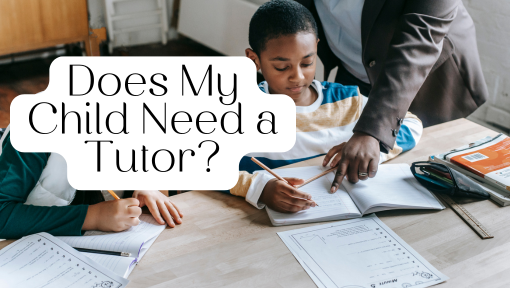As parents, we wear a lot of hats. We’re the chef, the chauffeur, the comforter—and if you homeschool, you’re also the teacher. So when your child starts struggling in a certain subject, it’s hard not to take it personally. I’ve been there. And I know how overwhelming it can feel when you start wondering… Does my child need a tutor?
If you’ve been asking yourself that question, you’re not alone. In fact, that inner nudge could be the first clue that it’s time to explore extra support.
Let me walk you through some common signs I see in families I work with—plus what to do if you’re noticing them too.
1. Your child’s confidence is dropping.
Sometimes the first indicator that something’s off isn’t academic—it’s emotional. You might notice your child is avoiding certain subjects, getting easily frustrated, or saying things like, “I’m just not good at this.” That self-doubt can be a heavy burden for young learners.
If school is becoming a daily battle or your child seems to be losing their spark, tutoring can help rebuild their confidence and reconnect them to the joy of learning.
2. You’re stuck in a cycle of reteaching.
Do you find yourself explaining the same concept over and over—and it’s just not sticking? Maybe you’ve tried three different math programs, watched all the YouTube videos, and still feel like you’re not making progress. That’s not a failure on your part. Sometimes it just takes a different voice or approach to make something click.
A tutor can act as a fresh set of eyes and bring in creative strategies to support your child’s learning style.
3. You’re feeling burnt out.
Let’s be honest—homeschooling takes a lot out of us. And if your child is struggling in a specific area, the stress can pile on quickly. You might start dreading certain subjects or feel like you’re failing your child (you’re not, by the way!).
Inviting a tutor into your homeschool rhythm doesn’t mean giving up control—it means gaining support. It can help restore peace and balance in your home while still prioritizing your child’s education.
4. You want your child to be challenged more.
Not all tutoring is for struggling learners—some students need to be stretched. If your child finishes their work quickly, seems bored, or asks questions that go beyond what your current curriculum offers, a tutor can help feed that hunger for more.
Tutoring can be a great way to enrich learning, introduce new subjects, or dive deeper into topics that light your child up.
So, What Should You Do Next?
If any of these signs sound familiar, it may be time to explore tutoring as an option. Here’s what I recommend:
- Start with a conversation. Talk with your child and ask how they feel about their learning. Their responses can offer valuable insight into what’s really going on.
- Reflect on your goals. Think about where your child is and where you’d like them to be. This will help guide your next steps.
- Reach out for a consultation. I offer personalized tutoring for families just like yours. Whether it’s weekly sessions or occasional check-ins, we can work together to create a plan that fits your child’s needs.
👉 Ready to chat more? Contact me here, or check out my homeschool coaching page if you want support for yourself as the parent-educator too.
You don’t have to do this alone. I’m here to help your child feel capable, confident, and curious again.


 I'm Tracy Kelly- a Christian, wife, and homeschooling mom of 3 amazing kids, and welcome to my blog!
I'm Tracy Kelly- a Christian, wife, and homeschooling mom of 3 amazing kids, and welcome to my blog! 